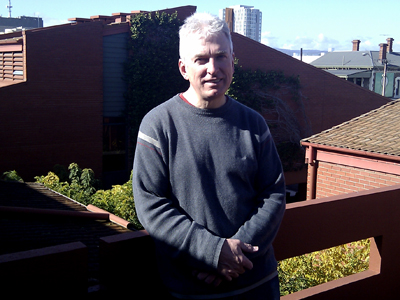Planet Software on being 'lean and mean'

company profile In a software development world dominated by behemoths of global girth, Adelaide's Planet Software is a fiercely independent, tiny and agile company that is dishing up software for all sorts of clients such as Anglicare, the AFL and almost every university in Australia.

Dean Rosenhain(Credit: Planet Software)
Think of them as the spry, kung-fu master Bruce Lee to Oracle's muscle-bound 80's wrestler Hulk Hogan. It's proof that the size of a company doesn't necessarily equate to sophistication in product offerings or the extent of its ambitions.
We spoke to Dean Rosenhain, one of the directors of Planet Software, about what makes the company tick, freeware, the power of word of mouth and governments overlooking small businesses.
"We are probably a typical Adelaide organisation. Over the last 10 to 12 years we've grown from having three to four people but it usually yo-yos around 10 to 15 people depending on the financial situation of the state, with your [global financial crisis] and what not," said Rosenhain.
For him, being streamlined and agile has meant that the company has managed to dodge bullets that would have brought a fat, lumbering company down.
"We've weathered a few fairly serious downturns in our market over the last 10 years for being quite lean and mean. We don't have any great plans for huge numbers of staff — we're a very flat organisation and there's only one person who is non technical in the whole organisation. So our intention is staying around that number and to maximise profitability in that number," he said.
Planet Software seems to be a strange name for a small Adelaide company that has had on average, less than 20 staff throughout its 15-odd years of operation. However, working in conjunction with the Joanna Briggs Institute, Planet Software helped develop a dynamic database system used for best practice in health care information across the globe. The company may be standing on local soil, but its scope is planet-wide.
Starting off as a reseller of IBM, Mac and Intel products for its parent company, and doing the occasional engineering job, Planet Software became a fully-fledged software developer, rising from the ashes of its parent's eventual demise. Planet Software became a certified Microsoft Gold Partner four years ago and currently has a plethora of applications available to buy and download from its website.
A planet's backbone
"All of our development is in Visual Studio 2010. We also use TFS, which is Microsoft's Team Foundation Server. It's like a source control and project management tool," he explained.
All the developers are given a notebook computer (currently, a high spec, 13-inch Dell XPS model — Rosenhain said that developers had become sick of lugging around 17 inches) and 22- to 23-inch monitors. With the ability for developers to remotely access the Foundation Server and work through virtual private networks, it seems that the underpinning ethos of Planet Software's back line is mobility.
It's something that also applies to the laissez-faire work environment.
"We're not a traditional work-from-home company, we have offices for our developers, but our developers are encouraged to work from wherever they are comfortable," said Rosenhain.
"If the customers think that the application is fantastic and delivered on time and the people they speak to at Planet Software are always nice to them, then that's the true measure of whether a developer is doing a good job or not."
"No one gets frowned on if they leave the office at 2pm in the afternoon. We've got a guy who comes into the office at 2pm in the afternoon and goes home at 9pm at night," said Rosenhain. Workers are also encouraged to take four full weeks of vacation. If they do so, they are rewarded with two extra weeks of holiday to fit around major projects. According to Rosenhain, it's also an effective way of combating accumulated leave debt.
Freeware: the power of word of mouth
For a company, run by what Rosenhain calls "technical people", it seems to do remarkably well without a dedicated marketing team. Whilst he acknowledges that this is a downside (and the company may hire a sales "personality" now and then), it also means that many of the products have to speak for themselves, passed on through word of mouth.
"They find out about [our products] by talking to each other," said Rosenhain, giving the example of Sonia, a piece of software used by university and tertiary education organisations to manage students in work placements. According to Rosenhain, it has been quite successful and has been adopted by major universities like The University of Sydney, Royal Melbourne Institute of Technology and others across the nation.
Another way the company has raised its profile is by offering free programs to download.
"What it does do is raise the company's name a bit because search engines are hitting the site and people are actually going to the site — it just raises general awareness of the company's name on the internet," said Rosenhain when quizzed about the value of freeware programs.
It's not easy being lean
While a great deal of Planet Software's success comes from a close knit team and direct relationships with its clients, its small size often means the business is overlooked in requests for tender by the government.
Rosenhain cites an example of a government workforce committee inviting companies to lodge an application for tender to improve the placement of students in hospitals. While Planet Software had offered a proposal, it didn't have the resources to write the application and has since heard nothing from the board. Often, the end result is that a large company will be contracted, which can mean a more expensive project.
"[The government] often spend two to three times what the project is worth in getting tenders and they'll want $10 million indemnity insurance on a project that may be worth ten thousand dollars," he said, adding that the process was a bit of "a pain in the arse".
"It's like the NBN fiasco; they're messing around so much. If you talked to a small entrepreneurial company like Internode that says 'I can make this happen', it would've happened two years ago," said Rosenhain.
"There are a lot of hoops and things that a growing small company looks at and says: 'I don't want to get involved with that'."
Rosenhain believes that the problem lies in the government's desire to be seen "doing the right thing" and crossing its t's in fear of backlash by the media and ministers.
It's something that could be detrimental to Australian innovation.
"Small companies drive the nation; there are so many great ideas that small companies come up with. Often opportunities get missed out for the rest of the country," he added.
"I know that the government thinks it's supporting us — there's certainly some things that happen. Like, in SA there's a team called Innovate SA that run courses on things like marketing and management," said Rosenhain.
However, often this information can get lost in the frenetic day-to-day running of an office.
"A small company is always concerned about cashflow and where the next large project is coming from and how do I keep my developers, so not many of these courses end up being that useful."
Expanding
True to its name, the Adelaide software company will be taking on the rest of the planet in its future endeavours.
"[The joint health database project with Joanna Briggs Institute] has inspired us to look overseas for our next foray, we're already supporting international and national Sonia projects from Adelaide and we think we've learned enough from that process to attempt to market that overseas," said Rosenhain.